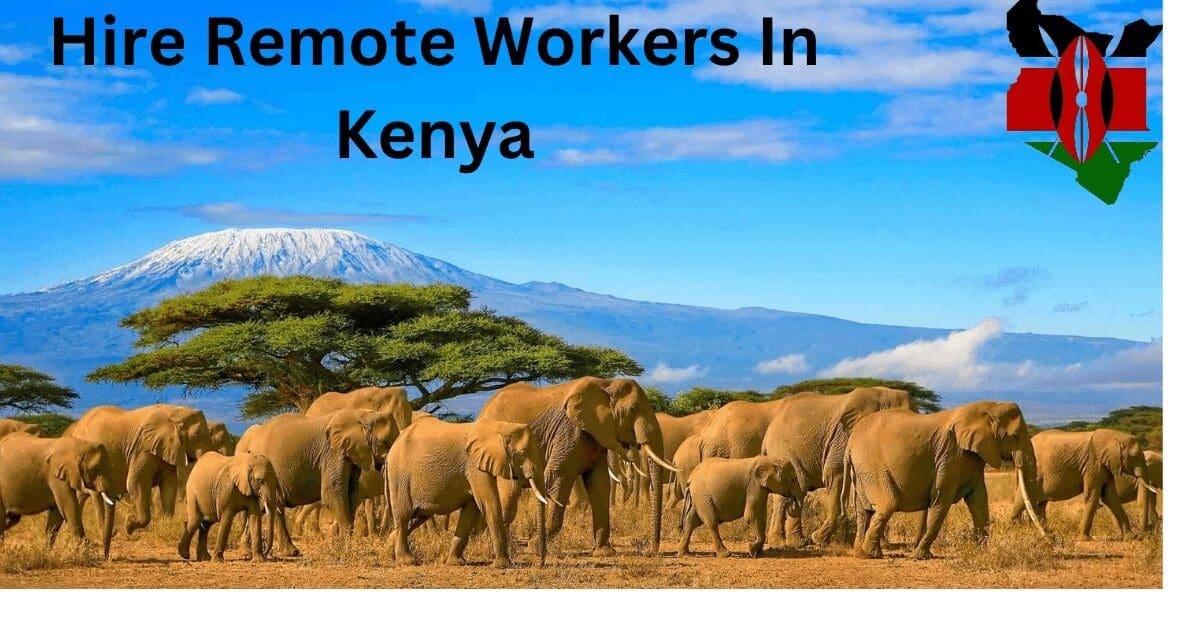Kenya has one of the most youthful populations in Africa. A recent study conducted showed that Kenya has over 80% of the population aged below 35 years and below. This youthful population in Kenya is renowned for their strong work ethic, excellent communication skills, and adaptability, making them valuable assets for employers looking to hire remote teams.
State of Digital Infrastructure Kenya
Let’s take a closer look at how Kenya has radically digitized its population and infrastructure
- In 2023, Kenya’s internet penetration stood at 32.7 percent, with over 17.86 million internet users across all the regions.
- Kenya has established numerous programs to facilitate coding classes and other digital programs, making it one of Africa’s leading pipelines for digital talent.
- According to a study conducted by a leading firm, remote work is expected to grow rapidly in 2024 because of good internet connectivity across the regions.
- Over 1.2 million Kenyans are now remote nomads, and this number is expected to rise in 2024.
From the above data, it is clear that Kenya is a valuable asset for companies looking to hire Remote workers in Kenya.
Related: How To Hire Remote Workers 2024
Labor Law in Kenya Explained
Kenya boasts a seamless legal framework designed to protect the rights of employers and workers. These regulations are designed to ensure that there is fair treatment, healthy working conditions, and nondiscrimination among the parties.
Let’s take a closer look at the most crucial labor laws to ensure you hire seamlessly in Kenya.
(a) Fair Wages
- The minimum wage in Kenya remains at 15120 KES per month in Nairobi, Mombasa, and Kisumu. However, in the cities, municipalities, and town councils of Mavoko, Ruiru, and Limuru, it is 14,025.40 KES. For all other areas (neither cities nor municipalities nor town councils), it is 8,109.90 KES.
- The minimum wage is reviewed every two years, or earlier if necessary.
(b) Working Hours
The standard set working hours is 40-45 per week. From Monday to Friday.
(c)Overtime Pay
- Employees are entitled to overpay if they work more than the standard working hours.
- It is usually included in an employee’s regular paycheck for the corresponding pay period.
- The overtime rate in Kenya is calculated as follows: Overtime Pay = Overtime Hours × Overtime Rate.
(d)Probation Period in Kenya
- It is usually 3 to 6 months and as an employer, you must state it is a probation period
(e) Notice Period
- The notice period for employment termination is 28 days if the contract is for monthly payment
Other crucial details you need to know before hiring in Kenya
Time Zone & IDD
UTC+3, IDD +254
Currency and exchange rate
Kenyan Shilling (KES)
For the latest exchange rates, check them out here.
Language spoken in Kenya
Swahili and English
Public Holidays
| Month | Occasions |
| 1st January | New Year’s day |
| 29th March | Good Friday |
| 1st April | Easter Monday |
| 10th April | End of Ramadan (Eid-al-Fitr) |
| 1st May | Labor Day |
| 1st June | Madaraka day |
| 16th June | Feast of the Sacrifice (Eid-Al-Adha) |
| 10th Oct | Moi day |
| 20th Oct | Mashujaa day |
| 21st Oct | Mashujaa day (Substitute day) |
| 12th Dec | Jamhuri day |
| 25th Dec | Christmas |
| 26th Dec | Boxing day |
Overview of the talent pool in Kenya
Kenya boasts a dynamic and diverse talent pool with a young and growing population. This workforce has shown significant growth, particularly in sectors like technology, agriculture, and finance. Let’s take a closer look of these aspects:
- Kenya ranks 4th in Africa for professional developers. Big tech companies like Google and Amazon are setting up hubs, further fueling growth and competition.
- The country prioritizes education, with a growing number of universities and vocational training centers. This provides a steady stream of skilled graduates for companies looking to hire remote workers in Kenya.
- Kenya is known for its innovative spirit and willingness to take risks. This fosters a dynamic environment and drives business growth.
- English is widely spoken across all regions, making Kenyan talent accessible to international companies and projects.
- With a population of 54 million, which is projected to grow to 56 million in 2024, Kenya presents a large and varied workforce.
Top talent hubs in Kenya
Nairobi County
Nairobi remains the leading talent hub in Kenya, primarily driven by its established tech ecosystem, numerous universities, and presence of multinational companies. In Nairobi County, you will find a range of creative digital marketing experts, tech-savvy developers, and designers who will supercharge your business.
Mombasa County
Mombasa is situated along the coast. It is one of the major tourist destinations in Kenya. Known for its beaches, history, and culture. In Mombasa, you will find fantastic remote talents like engineers, content creators, marketers, and developers.
Kisumu County
Kisumu is the economic hub of western Kenya and boasts universities like Maseno University, contributing to a growing talent pool in fields like business, education, and healthcare.
Kiambu County
Kiambu’s proximity to Nairobi. Know for industrial areas. You will attract talent in manufacturing, engineering, and logistics. Universities like JKUAT further contribute to the skilled workforce.
Nakuru County
Nakuru is one of the counties that is gaining a lot of traction in 2024. Startups, tech hubs, and established companies like Google and Airtel have established companies. Nakuru, you will attract a remote talent pool in fields such as IT experts, engineering, and business developers.
How to attract top remote talent in Kenya
Attracting top remote talent in Kenya involves a combination of understanding the local job market, culture and leveraging the benefits of remote work, and creating an attractive work environment. Here are some strategies you should consider:
- Embrace Cultural Diversity: and Inclusion Kenyan professionals highly value a diverse and inclusive work environment. A company that emphasizes commitment and diversity will create an opportunity for Kenyan professionals from different backgrounds to feel a sense of belonging.
- Flexible Work Arrangements: Kenyan talents value the ability to manage their schedule because they have other responsibilities beyond working, such as family and community engagement. As a company, you need to emphasize the flexibility of remote work to allow individuals to manage their schedules properly.
- Target talent in specific counties: Consider areas like Nairobi, Nakuru, and Kisumu with growing tech hubs and a strong talent pool.
- Leverage online platforms: Utilize platforms like Kick Jobs, which has over 20,000 young professional visitors, and Upwork to reach and hire remote workers in Kenya.
Related Hire Developers For Startup 2024- Ultimate Guide







